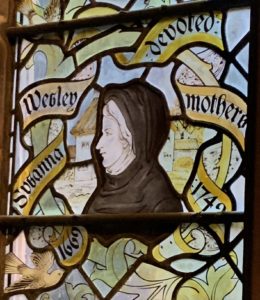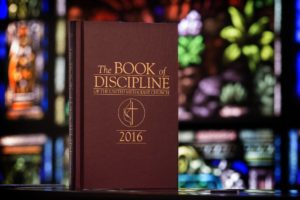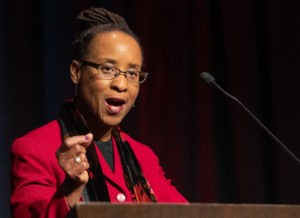Here’s the thing about getting guidance from God: It takes the kind of spiritual labor that we humans, with our penchant for control, mostly abhor — patient waiting marked by willing surrender, emptying oneself of ego and expectations. With an almost genetic need to plan, organize, and act, United Methodists aren’t inclined to sit still and listen until God makes the divine will known.
This reality probably marks the biggest obstacle facing a new United Methodist movement called “Out of Chaos … Creation.” Even in one of its first webinars, the ad hoc group fielded questions about the specifics of its aims and methods while its leaders tried to foster an openness to waiting for discernment.
From two July 7 webinars — held at different times to accommodate international time zones — participants’ push for specifics can be understood from both Methodist history and contemporary events.

A stained glass window in the Liverpool Cathedral (Church of England) honors Susanna Wesley.
First, Methodists have a need for specifics encoded into their spiritual DNA. Methodism’s founder, John Wesley, was schooled from birth in the importance of regular faith practices by his smart, strong-willed mother, Susanna Wesley. (Susanna was such a formidably committed Christian that when her Anglican priest husband, Samuel, chastised her for holding Bible study in his absence, she replied that she refused to face God’s judgment if she denied salvation to even one lost soul.)
Samuel and Susanna’s son, John, was a textbook example of an overachiever. Beginning at Oxford with a group taunted as “the Holy Club,” John tried to apply his mother’s strict principles to reforming the moribund Church of England.
Even after he became an ordained priest, John’s innovations were too threatening for the rigid Anglican system. Instead, Wesley ended up creating not only a spiritually disciplined movement in England, but a new church that formally organized in the new United States of America after the Revolutionary War. Even the UMC’s set of governing rules is known as “The Book of Discipline.”

United Methodist Book of Discipline
Unfortunately, United Methodists have taken their need for specifics to an end that Pharisees would envy, trying to legislate every jot and tittle of church life. The current Book of Discipline created by the 2016 General Conference runs more than 900 pages, divided into more than 2,700 numbered topical paragraphs. As a consequence, few but the most dedicated clergy and laypeople know what’s in the Discipline. Daily transgressions of the rules occur by omission and commission, but unless it’s something to do with money or sex, nobody pays much attention.
Second, United Methodists are grasping for some kind of handles to keep their fractured church from splintering. The denomination has been looking at separation since 2016 when the last General Conference (the church’s top legislative body) nearly imploded from the four-decade battle over the acceptance of LGBTQ people. An interim assembly in 2019 was supposed to resolve the issue, but a carefully crafted “live and let live” plan created by a special commission was shot down by a margin of fewer than 50 votes. In its place, conservatives enacted harsh penalties for violating the UMC’s anti-LGBTQ practices, setting off an American rebellion that scared the worldwide church, because American United Methodists pay the UMC’s bills.
“United Methodists are grasping for some kind of handles to keep their fractured church from splintering.”
Even before organizers put off the 2020 conclave because of the coronavirus pandemic, an informal group of delegates was discussing alternatives to what they feared would be another knock-down, drag-out General Conference battle. Out of their conversations, 15 delegates (out of nearly 900) drafted a vision statement, “Out of Chaos, Creation: Seeds of a Vision for a Renewed United Methodism,” that is long on aspirations but short on the specifics that United Methodists crave. As a model for the kind of global inclusion leaders seek, the statement is available in English, Spanish, French, German and two Filipino dialects, Tagalog and Ilokano.

Kennetha J. Bigham-Tsai addresses the 2020 Pre-General Conference Briefing in Nashville, Tenn. (Photo by Mike DuBose, UM News.)
“We are an unofficial group, doing this on behalf of The United Methodist Church that we love,” one of the organizers, Kennetha Bigham-Tsai, said in a telephone interview. “We’re not imagining something other than The United Methodist Church; we’re doing this on behalf of a worldwide church that we intend to be part of.”
Bigham-Tsai said she and her colleagues aren’t competing with any other group or legislative plan. Instead, she said, they want to use the months between now and the next General Conference, scheduled to start Aug. 29, 2021, to “breathe and think” about what God wants for the UMC’s future.
They intend to accomplish this discernment through a series of conversations led by local church leaders around the world. They’ve crafted a study guide to help local moderators conduct “discussions, not debates” about the UMC’s future. They ask that the results of local conversations be reported on a Google form posted on the website.
The time may be right for the kind of discussions “Out of Chaos” wants, but it’s still likely to be a difficult and messy process with uncertain results, at least as far as the next General Conference goes. Nearly three-fourths of the July 7 participants responded that they are “concerned, but hopeful” about the denomination’s future. Their webinar comments showed that they’re weary of the family feud over theological interpretations about human sexuality. They want a church that is open to all people regardless of status or characteristic, one that “walks the talk” of a gospel encompassing both personal salvation and social holiness.
From a biblical perspective, “Out of Chaos” best resembles the state of the Hebrews at the beginning of the Exodus. The movement’s leaders and its earliest participants seem willing to be led by God into an uncertain future for the sake of liberation from the bondage of irreconcilable differences. Other United Methodists, possibly even a majority, find the prospect of surrendering their religious control to discernment of God’s will too uncomfortable, perhaps even terrifying, to attempt. They’d rather stay in the Egypt of familiar practices, even though those practices oppress many inside and outside the church.
A clearer picture may emerge when “Out of Chaos … Creation” reports the results of local discussions during its next set of webinars on Oct. 12. Until then, its leaders and participants will be looking for the cloud and fiery pillar to guide them toward a new land.
